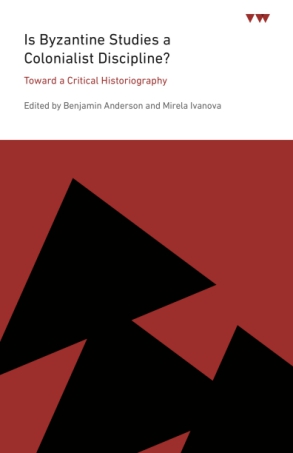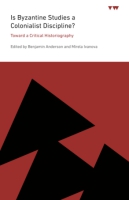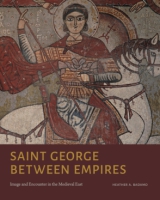
Is Byzantine Studies a Colonialist Discipline?
Toward a Critical Historiography
Edited by Benjamin Anderson and Mirela Ivanova
Is Byzantine Studies a Colonialist Discipline?
Toward a Critical Historiography
Edited by Benjamin Anderson and Mirela Ivanova
“With this slim yet rich and thoughtful volume, the field of Byzantine studies has finally joined the project of excavating the colonialist, imperialist, and white supremacist foundations of modern academia. This collection of essays does more than merely remedy a scholarly lacuna; it sounds an urgent call to action that is bound to reverberate in years to come, generating further self-reflection, debate, and dialogue.”
- Description
- Reviews
- Bio
- Table of Contents
- Sample Chapters
- Subjects
In this volume, scholars of art, history, and literature address the entanglements, past and present, among the academic discipline of Byzantine Studies and the practice and legacies of European colonialism. Starting with the premise that Byzantium and the field of Byzantine studies are simultaneously colonial and colonized, the chapters address topics ranging from the material basis of philological scholarship and its uses in modern politics to the colonial plunder of art and its consequences for curatorial practice in the present. The book concludes with a bibliography that serves as a foundation for a coherent and systematic critical historiography. Bringing together insights from scholars working in different disciplines, regions, and institutions, Is Byzantine Studies a Colonialist Discipline? urges practitioners to reckon with the discipline’s colonialist, imperialist, and white supremacist history.
In addition to the editors, the contributors to this volume include Andrea Myers Achi, Nathanael Aschenbrenner, Bahattin Bayram, Averil Cameron, Stephanie R. Caruso, Şebnem Dönbekci, Hugh G. Jeffery, Anthony Kaldellis, Matthew Kinloch, Nicholas S. M. Matheou, Maria Mavroudi, Zeynep Olgun, Arietta Papaconstantinou, Jake Ransohoff, Alexandra Vukovich, Elizabeth Dospěl Williams, and Arielle Winnik.
“With this slim yet rich and thoughtful volume, the field of Byzantine studies has finally joined the project of excavating the colonialist, imperialist, and white supremacist foundations of modern academia. This collection of essays does more than merely remedy a scholarly lacuna; it sounds an urgent call to action that is bound to reverberate in years to come, generating further self-reflection, debate, and dialogue.”
“This dynamic, multivocal volume has the potential to reshape not only the field of Byzantine studies but also larger movements within the humanities, with outstanding contributions by Aschenbrenner and Ransohoff, Achi, and Williams. Anderson and Ivanova’s work—particularly its willingness to engage with critical race and decolonial studies—will appeal to Byzantinists as well as those engaged in global medieval studies and adjacent fields, especially Ethiopian and Islamic studies.”
Benjamin Anderson is Associate Professor of the History of Art and Classics at Cornell University. He is the author of Cosmos and Community in Early Medieval Art and coeditor of Antiquarianisms: Contact, Conflict, Comparison, and The Byzantine Neighbourhood: Urban Space and Political Action.
Mirela Ivanova is Lecturer in Medieval History at the University of Sheffield. She is the author of Inventing Slavonic: Cultures of Writing Between Rome and Constantinople.
List of Illustrations
Preface: The Historical Conjuncture
Introduction: For a Critical Historiography of Byzantine Studies
Benjamin Anderson and Mirela Ivanova
Part 1: How Is Byzantine Studies (Re)Produced?
1. Hieronymus Wolf’s Silver Tongue: Early Byzantine Scholarship at the Intersection of Slavery, Colonialism, and the Crusades
Nathanael Aschenbrenner and Jake Ransohoff
2. Byzantine Archaeology: Teaching the Tenth and the Twentieth Centuries
Hugh G. Jeffery
3. Byzantium in Exile
Şebnem Dönbekci, Bahattin Bayram, and Zeynep Olgun
Part 2: How Is Byzantium (Re)Produced?
4. Methodological Imperialism
Nicholas S. M. Matheou
5. The Price of Admission
Anthony Kaldellis
6. Byzantine Studies: A Field Ripe for Disruption
Averil Cameron
7. Subaltern Byzantinism
Maria Mavroudi
Part 3: How Are Byzantine Texts (Re)Produced?
8. Byzantine and Western Narratives: A Dialogue of Empires
Arietta Papaconstantinou
9. The Ethnic Process
Alexandra Vukovich
10. Publication and Citation Practices: Enclosure, Extractivism, and Gatekeeping in Byzantine Studies
Matthew Kinloch
Part 4: How Is Byzantine Art (Re)Produced?
11. The South Kensington Museum, Byzantine Egyptian Textiles, and Art-Historical Imperialism
Arielle Winnik
12. From Ethnographic Illustration to Aphrodisian Magistrate: Changing Perceptions of an Early Byzantine Portrait
Stephanie R. Caruso
13. Expanding and Decentering Byzantium: The Acquisition of an Ethiopian Double-Sided Gospel Leaf
Andrea Myers Achi
14. Equity, Accessibility, and New Narratives for Byzantine Art in the Museum
Elizabeth Dospěl Williams
A Collective Bibliography Toward a Critical Historiography of Byzantine Studies
List of Contributors
Index
Download a PDF sample chapter here: Introduction
Also of Interest
Mailing List
Subscribe to our mailing list and be notified about new titles, journals and catalogs.






